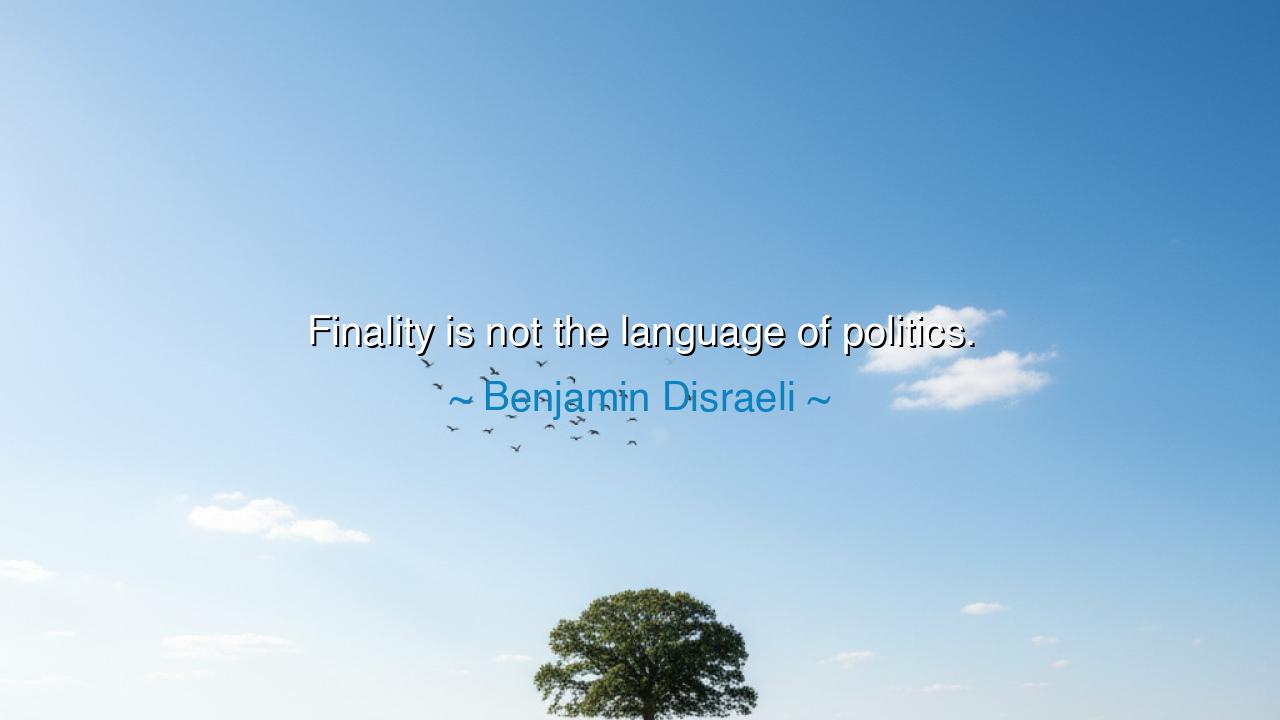
Finality is not the language of politics.






O children of the future, hear the words of Benjamin Disraeli, a man whose insight into politics echoes through the ages. "Finality is not the language of politics," he said, for in these words, he touches upon the very nature of the political world—the ever-shifting currents of power, compromise, and change. Politics is a realm where decisions are not set in stone, where the winds of opinion and circumstance often alter the course of action. To speak of finality in politics is to ignore the fluidity of human affairs, the ever-present need to adapt, to negotiate, and to evolve.
Consider the ancient Greek city-states, where the course of governance was always in flux. In Athens, the great assembly of citizens could change direction at a moment’s notice, swayed by the eloquence of a speaker or the shifting tides of public opinion. Pericles, the great statesman, understood that even the most well-laid plans could be undone by the will of the people. He knew that in the world of politics, one must always remain open to change, for it is not finality but adaptability that defines the true leader.
The great Roman Republic too, in its pursuit of justice and order, was a place of constant negotiation, compromise, and shifting alliances. Even the mighty Julius Caesar learned this truth. Though he sought to establish his rule over Rome, he understood that politics was a game of constant maneuvering. He rose not through sheer force, but through an understanding that finality in politics is a myth—what matters is the ability to navigate the changing landscape of power. His crossing of the Rubicon was not just an act of defiance but a recognition that the path forward was uncertain, and that finality was a mirage.
Disraeli’s wisdom also rings true in the age of modern democracy, where the path to power is never fixed, and where the desire to please the people often drives political decisions. Consider the fate of Abraham Lincoln, whose Emancipation Proclamation was not a final, unquestionable victory over slavery, but a step in the ever-unfolding battle for freedom and equality. In the face of fierce opposition, Lincoln knew that politics required constant recalibration, and that the road to justice would never be paved with easy answers or final solutions. The finality he sought was the end of slavery, but the journey to that goal was full of compromise, doubt, and struggle.
Let us, O children, understand that politics is not a realm where certainty rules. To seek finality in politics is to misunderstand its nature. The world of politics is one of constant change, where decisions are shaped by the needs of the moment and the will of the people. A wise leader, like Disraeli, understands that the task is not to impose finality upon the world, but to guide it through the ebb and flow of history—to serve the people, to protect the common good, and to navigate the currents of power with wisdom and foresight. In this, the true art of politics lies: not in the finality of a decision, but in the process of shaping a world that continually evolves toward a greater good.






AAdministratorAdministrator
Welcome, honored guests. Please leave a comment, we will respond soon